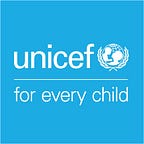Including Usher
One boy’s experience living with a disability
Usher Sanca is a 7-year-old with loving, supportive family members and friends. He is a first-grade student thriving at Ponta Nova Unified School, in Oio Region, Guinea-Bissau. He is also among an estimated 93 million children worldwide living with a disability.
Usher is expanding his young mind as he attends school, but worldwide, children with disabilities are more likely than their peers without disabilities to miss out on education. Such exclusion undermines opportunities for future social and economic security and full participation in society.
As he brushes his teeth and bathes before school, he receives help from his cousin Geralda, who is 15. The UNICEF-supported child-friendly school Usher attends promotes inclusive education for children living with disabilities.
Usher’s disability is physical and causes him to have difficulty with motor coordination. To dress for school, Usher is again assisted by Geralda, along with additional help from Usher’s ‘Grandma Nene’.
Usher has been welcomed into his school, where he studies alongside 48 classmates who do not have disabilities as one component of his inclusive education. While walking to class, Usher (centre) has the support of another cousin, 7-year-old Sadjo (left), and a friend.
His instructor, Antonio Mendoça, has received UNICEF-supported teacher training, including on how to foster an inclusive learning environment.
“I know Usher is capable of succeeding, especially if I keep working with him,” says Mr. Mendoça, who makes sure Usher sits near the front of the class.
Ensuring children with disabilities have individually tailored support as needed is another component of inclusive education.
“When we do an activity I give Usher directions and then I move around the classroom to help the others and finally come back to help him,” says Mr. Mendoça.
“Without education, it is difficult for able-bodied people to earn a living, but it is even more difficult for someone like Usher,” explains Mr. Mendoça. “His grandmother will not be here to take care of him forever. When he is educated, in the future, he will be able to take care of himself.”
Usher arrives home from school to find his grandmother preparing medicinal plants. A traditional healer, she has focused her skills on improving Usher’s health and has helped him with his walking abilities.
Usher eats a meal after school. Inclusion extends beyond the classroom, and it begins at home. The support Usher receives from his family sends a powerful message as he learns and grows: that he is a valued member of — and contributor to — his community and society.
While Usher is gaining skills at school that will help him support himself in the future, at home, he is practising ways to take care of himself — like learning how to change out of his own clothes.
And with the support of some of his many friends and cousins, he is reinforcing the skills he learns during the school day, as he practises his writing at home.
Usher also plays a role in completing household chores. Today, he’s helping keep his family’s pig and chickens away from drying peanuts as he assists his Grandma Nene in bagging them for sale.
There is also time to exercise his motor skills and creativity through a drum-playing session with cousins and friends.
Usher and Sadjo spend time together at home.
“[Usher] plays well with the other kids, and they always take care of him,” says Mr. Mendoça. “They do it spontaneously. But if there is a problem, Usher’s cousin, Sadjo, will protect him. He will stand between Usher and the others.”
Sadjo may be family, but Usher also considers his cousin his best friend.
“He is no different than the rest of us,” says Sadjo.
Whether at play or completing chores, in a relationship defined by loving acceptance, these two make a great team.
Learn more about UNICEF’s work to support children living with disabilities.
